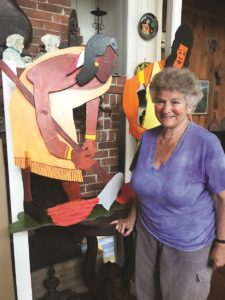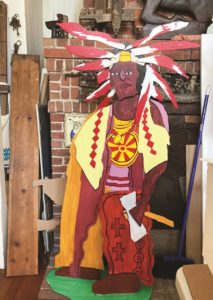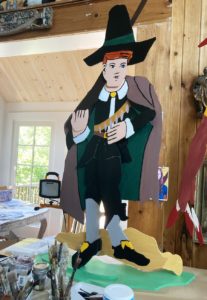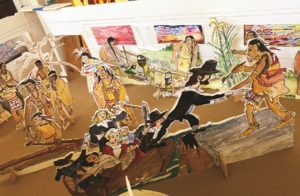TRURO — The select board voted unanimously on Feb. 22 to waive beach fire and parking fees for Native American tribe members.
Truro thus follows the lead of the town of Eastham, which in 2020 on the 400th anniversary of the landing of the Mayflower extended beach rights to indigenous people. The beach access declaration is meant to return to the Wampanoag their right to use the town’s beaches without cost.
The waivers also apply to “other Native Americans” — though this detail sparked a moment of charged discussion before the declaration was ultimately approved.
Helen McNeil-Ashton, a vice president of the Truro Historical Society, spearheaded the change in Truro. She said she plans to make a similar proposal to the Wellfleet Select Board and is waiting for it to be placed on a future agenda.
The idea arose when McNeil-Ashton curated materials for the “Wampanoag Nation: People of the First Light” exhibit, which opened in July 2021 at Truro’s Highland House Museum. During her research, she traced how certain ancestral rights were restored to Native people in Massachusetts.
A 1982 resolution adopted by the state House of Representatives recognized “the ancient and aboriginal claim of Indians within the Commonwealth … to hunt and fish the wildlife of this land for the sustenance of their families.” In 1984, a case in Barnstable District Court, Commonwealth v. Hendricks, et al., established that the Wampanoag could hunt and fish without securing state or town permits as long as they carried a tribal card.
Eastham extended these rights in November 2020 at the request of Jim Russo of the town’s 400 Commemoration Committee. The Eastham Select Board made tribal card holders eligible to receive seasonal visitor beach stickers free of charge.
When McNeil-Ashton heard of that initiative, she decided that Truro should follow suit.
At the select board meeting, she described granting beach access rights as “one of several small initial steps by which the Truro community can recognize and honor our Wampanoag Nation members and neighbors who have lived here for 12,000 years before the arrival of Europeans and who are still very much here and might like to visit the beaches.”
Truro residents also demonstrate respect for Native history by reading a land acknowledgement at the start of each town meeting.
Following McNeil-Ashton’s presentation, select board member John Dundas raised a concern about including “other Native Americans” among those eligible for the parking and fire permit waivers.
“Why wouldn’t it just include the Wampanoag Nation?” Dundas asked. “Why would you make it universal?” He later noted that Truro was declared the Wampanoag Nation’s land and recommended that other tribal groups be struck from the motion.
Kelly Clark, the assistant town manager, explained that she had added “and other Native Americans” to the declaration to include lesser-known tribes in the area.
Bob Weinstein, the select board chair, supported Clark. “I wouldn’t want someone representing the Mohawk tribes in eastern New York State or tribes in Maine who might be visitors to Cape Cod to have to pay a fee,” he said.
Dundas asked about reciprocity between states and whether neighboring New England states offered the same inclusivity to out-of-state members of the Wampanoag Nation. “I think it’s worth investigating before we agree to this,” he said.
“At first, I didn’t understand the motivation behind John’s comment,” said Kristen Reed, vice chair of the board, “but at the moment, it feels discriminative.”
“Absolutely not,” Dundas said. “I just want to make sure there’s reciprocity. It has nothing to do with what the vice chair just suggested.”
The board asked Annawon Weeden, a member of the Mashpee Wampanoag tribe, for his input. McNeil-Ashton had invited him to the meeting. He said tribal members have recently been gathering on the Outer Cape for “solstice fires” at the spring and fall equinoxes at Newcomb Hollow Beach in Wellfleet.
“These are open to other Natives residing in our community,” he said. These other attendees are often visitors from neighboring tribes such as the Narragansett, as well as those who married into the Wampanoag Nation.
“I appreciate the clarity,” Dundas said. “I have no opposition to the motion at all.”
The select board voted unanimously to approve the declaration. Later, Weeden told the Independent that the inclusion of other Native groups surprised him.
“I don’t know if I would have specifically asked for that,” he said. “But I’m really honored and glad. I wouldn’t want to explain to anybody visiting my tribe that they can’t enjoy the benefits that my tribe does.”




